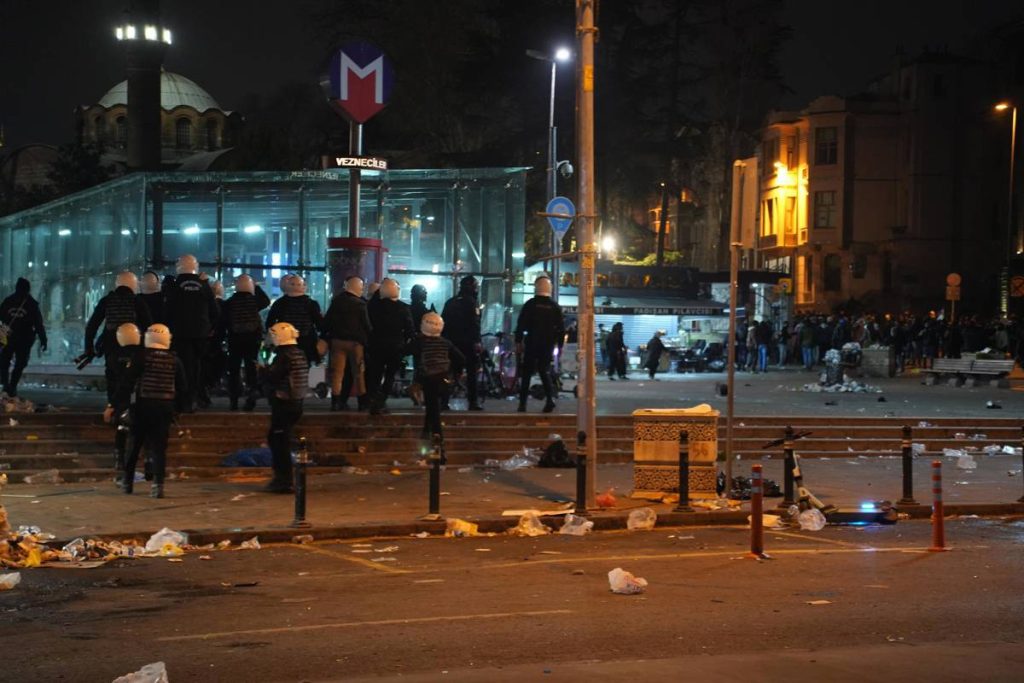Protests against the detention of İstanbul Mayor Ekrem İmamoğlu have erupted across the city, lasting over five consecutive days. The protests intensified following İmamoğlu’s formal remand in custody due to corruption-related charges, leading to large gatherings at Saraçhane Square and clashes with law enforcement. The situation has drawn national attention as the opposition party, the Republican People’s Party (CHP), continues to rally support for their presidential candidate amidst accusations of political persecution.
| Article Subheadings |
|---|
| 1) Background of the Protests |
| 2) Developments of the Arrest and Charges |
| 3) Violence and Police Response |
| 4) Political Implications and Response from CHP |
| 5) Public Sentiment and Future Outlook |
Background of the Protests
The unrest began shortly after the police detained İmamoğlu and numerous municipal officials in a targeted operation on March 19. This operation occurred just days before the CHP was expected to nominate İmamoğlu as their candidate for the presidential primary on March 23. The arrests are part of a broader crackdown on opposition figures amidst escalating political tensions in Turkey.
Authorities cite two investigations that involve a total of 106 suspects linked to allegations of terrorism and corruption. The first investigation focuses on the CHP’s cooperation with the Peoples’ Equality and Democracy Party during local elections. Officials argue that this alliance was directed by the outlawed Kurdistan Workers’ Party (PKK), accusing the CHP of complicity. The second investigation pertains to allegations of financial misconduct involving embezzlement, bribery, and fraud.
Developments of the Arrest and Charges
Following his initial detention, İmamoğlu was formally remanded on corruption charges after four days in custody. The Interior Ministry swiftly announced his suspension from office and indicated that an acting mayor would be elected by the municipal council on March 26. Despite him being jailed, the CHP continued their presidential primary, reaffirming his candidacy based on significant support from over 14 million voters nationwide.
On March 23, the court determined that while İmamoğlu’s arrest for terrorism-related charges was unnecessary, the corruption claims justified his detention. Subsequently, 51 individuals were remanded in custody, primarily related to accusations of financial misconduct. This development has heightened fears regarding the government’s tactics of undermining political opponents and stifling dissent.
Violence and Police Response
Throughout the protests, participants gathered daily in Saraçhane Square, with CHP leader Özgür Özel frequently addressing the crowds. His speeches galvanized hundreds, leading to calls for justice and resistance against oppressive measures. However, the police response has grown increasingly aggressive, employing tear gas, rubber bullets, and water cannons to disperse demonstrators.
Unlike previous nights when interventions were primarily localized, police pursued protesters into surrounding areas, escalating confrontations. Eyewitness accounts describe instances of indiscriminate firing of plastic bullets as officers chased individuals through streets. Reports indicated that many members of the public were detained during these clashes, with a total of 1,133 individuals taken into custody throughout the five days of protests, as confirmed by the Interior Minister.
Political Implications and Response from CHP
In light of the ongoing turmoil, the CHP has condemned the government’s actions, labeling them a coup against a democratically elected official. They argue that these arrests reflect an assault on democracy and civil liberties in Turkey. The party’s determination to maintain İmamoğlu’s candidacy for the upcoming elections despite his detention underscores their commitment to challenge the ruling authorities.
Student protests have also erupted in various cities, showcasing a surge in activism and solidarity among young people opposed to the current government. As protests evolve into a broader social movement, the CHP has relied heavily on mobilizing public sentiment, leveraging traditional political slogans and tactics while calling for renewed demonstrations.
Public Sentiment and Future Outlook
The atmosphere in Turkey is charged with political unrest, as citizens witness a growing authoritarian grip. The protests signify a deep-seated public discontent, reflected in slogans and sentiments resonating across social media platforms, despite intermittent restrictions imposed by authorities.
Moving forward, the CHP’s strategy will likely hinge on maintaining momentum of public support while navigating the intricacies of the political landscape, which remains fraught with challenges. The government’s response will also be closely monitored, as further crackdowns may risk igniting additional backlash among the populace.
| No. | Key Points |
|---|---|
| 1 | Protests in İstanbul against Mayor İmamoğlu’s arrest have lasted for five days, highlighting public support for the CHP. |
| 2 | İmamoğlu was officially charged with corruption while under custody, prompting significant political implications. |
| 3 | Police response to protests has escalated, resulting in numerous clashes and over 1,100 detentions. |
| 4 | The CHP has labeled the crackdown a political coup, reinforcing its opposition stance against the ruling government. |
| 5 | Public sentiment against government actions is evident, with wider protests emerging throughout the country. |
Summary
The situation in İstanbul illustrates a significant moment in Turkey’s political landscape, marked by widespread protests against the government and its treatment of opposition leaders. The arrest of Mayor İmamoğlu has become a focal point for citizens advocating for democratic values and transparency. As societal tensions rise, the coming days will reveal the resilience of political opposition and the government’s capacity to suppress dissent.
Frequently Asked Questions
Question: What led to the arrest of Mayor İmamoğlu?
Mayor İmamoğlu was arrested as part of a wider investigation involving corruption and alleged cooperation with a proscribed organization during local elections.
Question: How has the public reacted to the protests?
The public has shown significant support for the protests, evidenced by the large gatherings at Saraçhane Square and similar demonstrations occurring throughout the country.
Question: What future actions can be expected from the CHP?
The CHP is expected to continue rallying public support while addressing the ongoing political crisis and mobilizing demonstrations advocating for democracy and rule of law.
